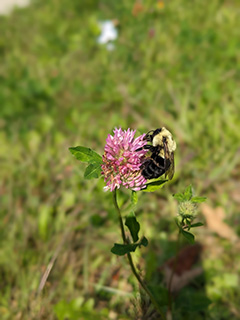In a buzzing development, ║┌┴Ž│į╣Ž═°has officially been designated the 20th Bee Campus in Canada.╠²
Bee City Canada, a Canadian non-profit dedicated to inspiring cities, towns, First Nations, schools, businesses and other organizations to take action to protect pollinators, offered ║┌┴Ž│į╣Ž═°the designation after assessing its pollinator initiatives.
 Becoming a Bee Campus requires demonstrating a commitment to creating habitats that foster the well-being and survival of pollinators such as bees, along with education initiatives and an annual celebration during pollinator week.╠²
Becoming a Bee Campus requires demonstrating a commitment to creating habitats that foster the well-being and survival of pollinators such as bees, along with education initiatives and an annual celebration during pollinator week.╠²
ŌĆ£We enjoyed [learning] about the habitat efforts that Dal has already made and plans for continued habitat creation,said Jordan Phelps, coordinator with Bee City Canada, in a message to the university. "Habitat is food and shelter for pollinators and . . . also the factor that is limiting their success and survival.ŌĆØ╠²
Shown right: A bee enjoys a bloom on Dal campus.
Dal boasts a diversity of gardens on its campuses, including an Indigenous pollinator garden, a╠²H├╝gelkultur garden bed, and a pollinator wall on Studley Campus in Halifax. On the Truro Campus, an impressive collection of gardens ŌĆö including the Bicentennial Botanical Garden, Alumni Gardens, Butterfly Pollinator Garden, Cultrivat8 Garden, and Herb Garden ŌĆö contribute to a thriving ecosystem.╠²
ŌĆ£║┌┴Ž│į╣Ž═°'s commitment to sustainability and pollinator well-being has now gained national recognition, marking a significant step towards fostering a healthier environment for both the campus and the broader community,ŌĆØ says Emily McLean, a student pollinator researcher and garden coordinator.
Dal provides support to Bee City Canada through an annual fee that helps the non-profit in its pollinator-friendly mission.╠²╠²
ŌĆ£By contributing to Bee City Canada, we align ourselves with a network of institutions collectively striving to make a positive impact on pollinator well-being and environmental sustainability,ŌĆØ said McLean.
Recommended reading:╠²Indigenous pollinator garden honours community figure while adding natural appeal to Dal campus
Creating a buzz -- together
She is part of DalhousieŌĆÖs very own pollinator team that leads initiatives related to protection across campus. The team, which╠² includes staff, faculty and students from various departments, was praised by╠² Bee City Canada, for its size and the diverse roles its members play in campus initiatives.
Bee City Campuses promote pollinator protection initiatives, educate students and staff about pollinator importance, cultivate attractive pollinator habitats on campus for biodiversity, and engage various departments in biodiversity and pollination-related studies and conversations.╠²
║┌┴Ž│į╣Ž═°was recognized, in particular, for its efforts in constructing pollinator habitats and its future plans for new habitat creation. Habitats play a big role in the success and survival of pollinators.╠²
"Your plans for nesting areas for bees demonstrate thoughtful strategies to minimize pests while offering students a chance to observe solitary bee behavior ŌĆöan exciting and educational initiative," said Phelps.╠²╠²

Flowers grow near a pollinator wall on Studley Campus.
DalŌĆÖs work planting native species and maintaining diverse gardens on campus was applauded as was the universityŌĆÖs plans to create nesting areas for bees that will emphasize the importance of small spaces to minimize pest issues and using transparent materials for student observation.╠²
Other initiatives that helped support DalŌĆÖs designation included:
ŌĆó The university's plans for pollinator habitat signage, complete with QR codes for detailed information, were commended as an excellent opportunity for educating students about planting for pollinators. (Stay tuned for our webpage, which will launch under the Office of Sustainability).
ŌĆó DalŌĆÖs commitment to educating students about the magic of solitary bee life.
ŌĆó Dalhousie's initiative to celebrate Biodiversity Day, with special mention of plans for pollinator-specific events and faculty involvement.╠²
Ecological advocacy
As an official Bee Campus, ║┌┴Ž│į╣Ž═°will be invited to Bee Campus meetings where campuses share initiatives and discuss opportunities for collaboration.
DalŌĆÖs designation underscores the universityŌĆÖs commitment to environmental sustainability and represents a pivotal step in supporting pollinator well-being.╠²
ŌĆ£Through this initiative, we aim to unite research and artistic expression with ecological advocacy, embodying our dedication to a diverse, inclusive, and environmentally conscious campus culture,ŌĆØ said McLean.
If you have questions or would like to get involved, email rethink@dal.ca.╠²
Recommended reading:╠²Planting project aims to restore biodiversity in a charming corner of campus

